On 16 May 1868, the New Town Theatre in Prague saw the premiere of Bedřich Smetana’s opera Dalibor. The premiere sounded on the day of the ceremonial laying of the foundation stone of the National Theatre with the composer conducting. Delving into Czech history, the libretto by Josef Wenzig was originally written in German and had to be translated into Czech. Critics attacked the opera for “not sounding sufficiently Czech,” with Smetana remarking, “I now recognise how little educated, musically educated our public is, despite all the musical establishments, concerts, operas, theatres which a city like Prague has in abundance.”
Bedřich Smetana: Dalibor, “Trailer”
Too Much Wagner?
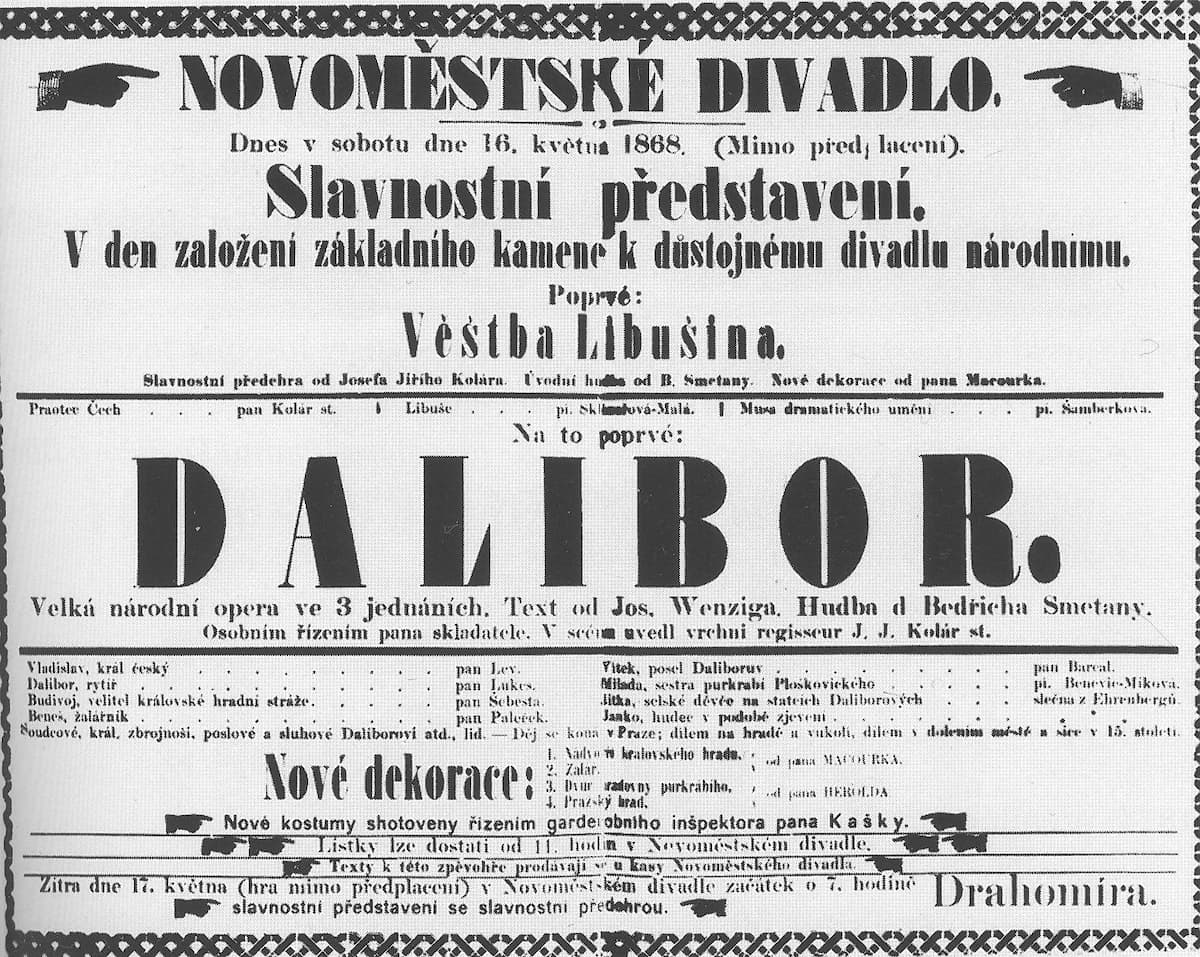
Smetana’s Dalibor performance poster
Smetana had captured the imagination of his audiences with his comedies The Bartered Bride and The Kiss. His serious operas, however, never really became popular. Scholars today place the fault on some contemporary critics who poisoned the musical landscape of Prague by questioning the degree of Wagnerian influence. While Wagner could not be ignored, Smetana was “aware of the dangers of adopting the Wagnerian model in the early days of establishing a Czech operatic style.”
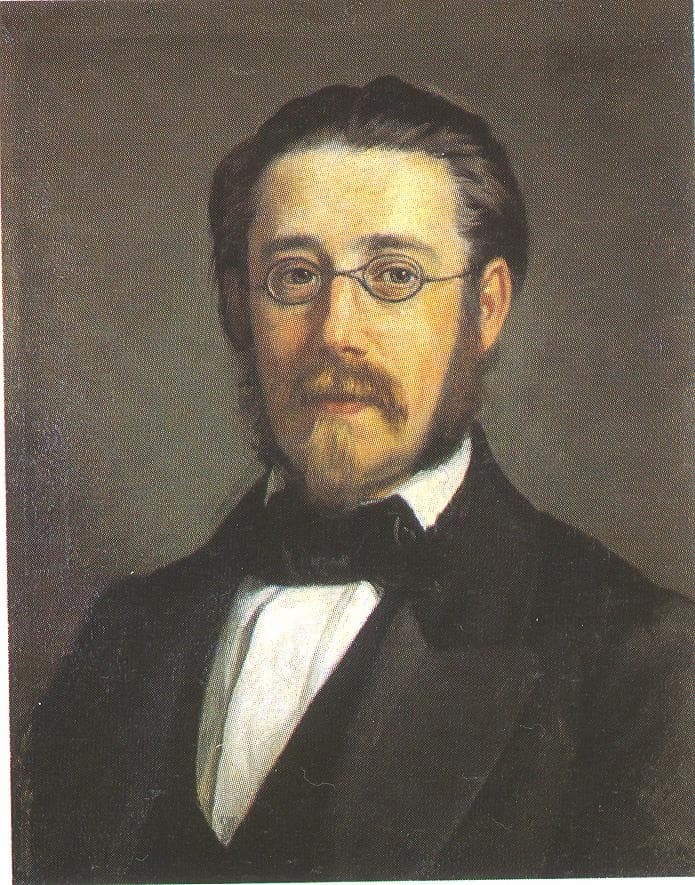
Bedřich Smetana
To be sure, there are a number of Wagnerian elements present, including a mythical story, and a system of thematic transformations that function in the manner of the leitmotif. For a number of observers, Dalibor “was an attempt to outdo Tristan.”
Bedřich Smetana: Dalibor – Act I Scene 1: Dnes ortel bude provolán (Václav Zítek, baritone; Vilem Přibyl, tenor; Bohuslav Maršík, bass; Jaroslav Horáček, baritone; Milos Jezil, tenor; Eva Děpoltová, soprano; Nada Šormová, soprano; Brno Janáček Opera Chorus; Brno Philharmonic Orchestra; Václav Smetáček, cond.)
The Story: Act 1
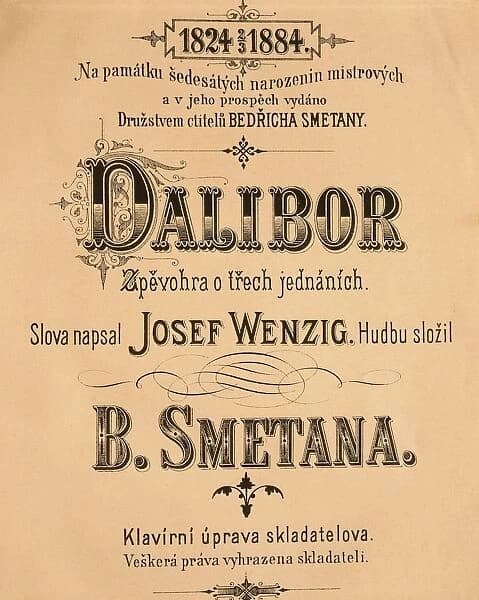
Smetana’s Dalibor piano score
The opera is set in Prague in the late fifteenth century during the reign of Vladislav II. Dalibor, a Czech noble, is on trial for having murdered the burgrave of Ploškovice in revenge for the execution of his friend, the musician Zdeněk. Smetana did not compose an overture, but he introduced the principal moto theme right away. We initially become witnesses to Dalibor’s trial, with fanfare announcing the entry of the King and the judges.
As the charges are brought against Dalibor, the burgrave’s sister Milada is called to testify. Dalibor admits his crime but explains that the deed was done in revenge for the brutal and humiliating murder of his dearest friend. He accepts his death sentence and looks forward to joining Zdeněk in paradise. Milada is greatly moved and begs the court to spare his life. Dalibor’s sentence is reduced to lifetime imprisonment, and having fallen in love with Dalibor, Milada resolves to set him free with Jitka, an orphan befriended by the knight.
Bedřich Smetana: Dalibor – Act I Scene 6: Jaká to bouře ňadra mi plní (Václav Zítek, baritone; Vilem Přibyl, tenor; Bohuslav Maršík, bass; Jaroslav Horáček, baritone; Milos Jezil, tenor; Eva Děpoltová, soprano; Nada Šormová, soprano; Brno Janáček Opera Chorus; Brno Philharmonic Orchestra; Václav Smetáček, cond.)
The Story: Act 2
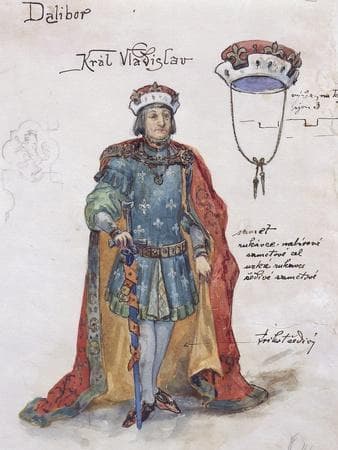
Costume design for King Vladislav
A brief prelude finds Jitka meeting her lover Vítek, and she describes how Milada, dressed as a boy with a harp in her hand, has charmed her way into the castle in search for Dalibor. She has found employment with Dalibor’s jailer, Beneš. Beneš is warned to be vigilant over Dalibor, and when he departs to fetch Zdeněk’s old violin, Milada expresses her agitation of seeing Dalibor. Beneš returns with the violin and asks Milada to take it to the prisoner.
Dalibor has woken from a dream about Zdeněk and is interrupted when Milada arrives. He is overjoyed at seeing the violin but does not notice the boy. Milada reveals herself and begging his forgiveness for her earlier pleas of vengeance, explains that she has come to rescue him. They sing a passionate duet, singing of their joy in having found each other.
Bedřich Smetana: Dalibor – Act II: Dalibore, odpusť prosím (Václav Zítek, baritone; Vilem Přibyl, tenor; Bohuslav Maršík, bass; Jaroslav Horáček, baritone; Milos Jezil, tenor; Eva Děpoltová, soprano; Nada Šormová, soprano; Brno Janáček Opera Chorus; Brno Philharmonic Orchestra; Václav Smetáček, cond.)
Bedřich Smetana: Dalibor – Act II: Ó nevýslovné štěstí lásky (Václav Zítek, baritone; Vilem Přibyl, tenor; Bohuslav Maršík, bass; Jaroslav Horáček, baritone; Milos Jezil, tenor; Eva Děpoltová, soprano; Nada Šormová, soprano; Brno Janáček Opera Chorus; Brno Philharmonic Orchestra; Václav Smetáček, cond.)
The Story: Act 3
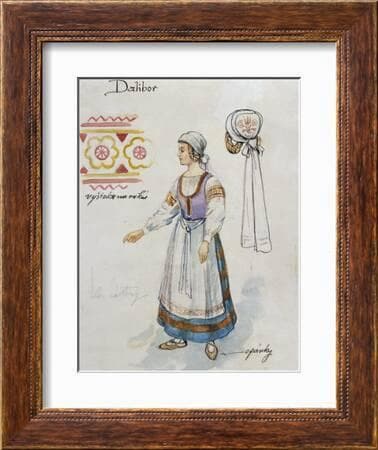
King Vladislav is warned that a rebellion by Dalibor’s people is spreading, and Beneš tells of the treachery of his assistant. Pressed by the judges, the King reluctantly condemns Dalibor to be executed and gives the necessary instructions. In the meantime, Dalibor has managed to break his shackles and the bars of his cell. As he attempts to signal his rescuers, a string on the violin breaks. The plot to bribe Beneš has failed, and the guards now take Dalibor to his execution.
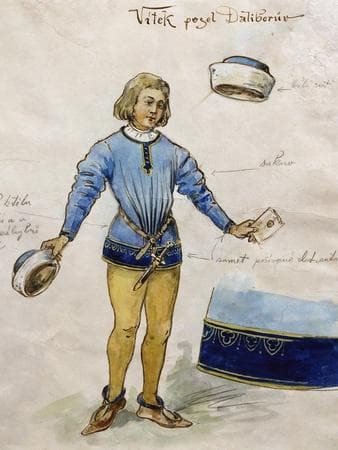
Costume design for Vítek
In front of the prison, Milada and her accomplices are waiting for Dalibor’s signal. Instead they hear a tolling bell and a sombre chorus of monks. Milada realises that they have been betrayed, and she now leads her supporters into the castle. She is mortally wounded and dies in Dalibor’s arms as he proclaims his love for her. The soldiers emerge from the castle and celebrate their victory, with Dalibor charging to his death.
Bedřich Smetana: Dalibor – Act III: Hle, rajská Vesny růže! (Václav Zítek, baritone; Vilem Přibyl, tenor; Bohuslav Maršík, bass; Jaroslav Horáček, baritone; Milos Jezil, tenor; Eva Děpoltová, soprano; Nada Šormová, soprano; Brno Janáček Opera Chorus; Brno Philharmonic Orchestra; Václav Smetáček, cond.)
Bedřich Smetana: Dalibor – Act III: Nepřátel zástup poražen a zbit (Václav Zítek, baritone; Vilem Přibyl, tenor; Bohuslav Maršík, bass; Jaroslav Horáček, baritone; Milos Jezil, tenor; Eva Děpoltová, soprano; Nada Šormová, soprano; Brno Janáček Opera Chorus; Brno Philharmonic Orchestra; Václav Smetáček, cond.)
Aftermath
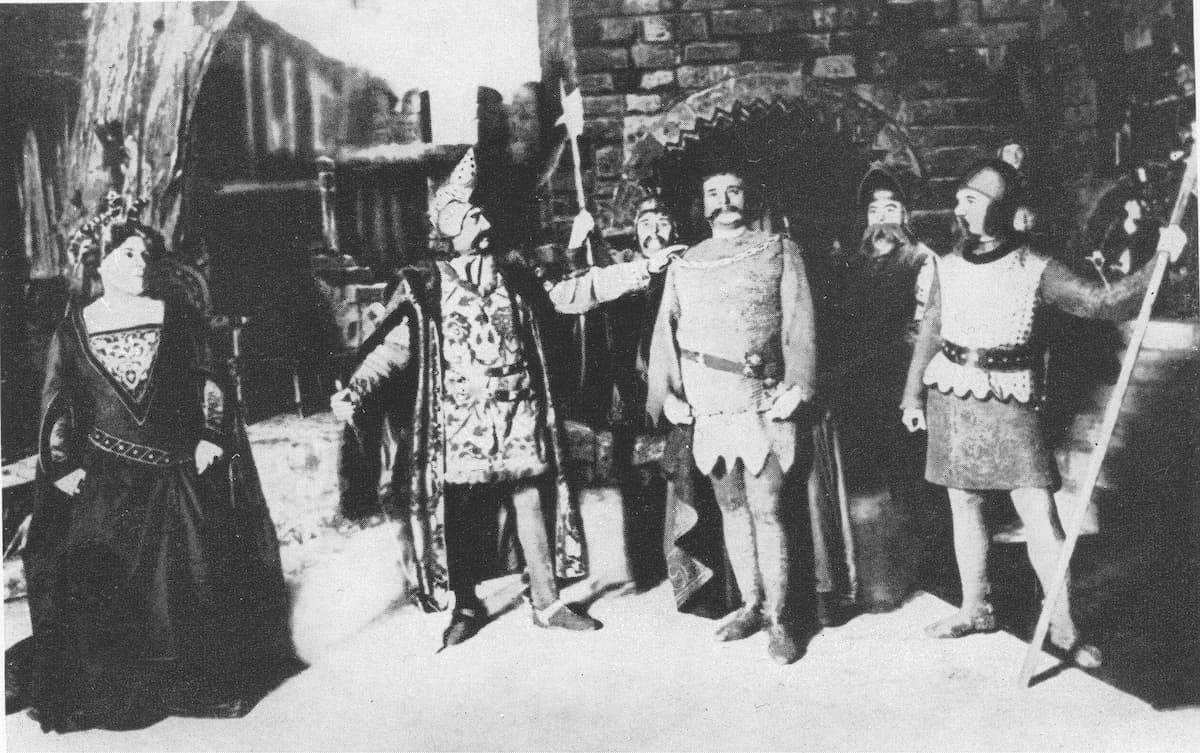
Smetana’s Dalibor performance in Berlin, 1909
Realising that Dalibor lacked public success, Smetana made some revisions in Act 2 and also revised and extended the end of Act 3. Sadly, these changes made in the 1870s had no effect on the opera’s fortunes. It was given a few times and disappeared from the repertory. It gained some popularity later, however, when it was first performed at the Prague National Theatre.
For scholar Jan Smaczny, “there are problems with plot and dramaturgy, as the development of the opening scene is too slow and the end of the opera comes too abruptly.” Nevertheless, the work is a celebration of music as the presence of the violin reinforces a favourite myth about the outstanding musicianship of Czech people.
For more of the best in classical music, sign up for our E-Newsletter
